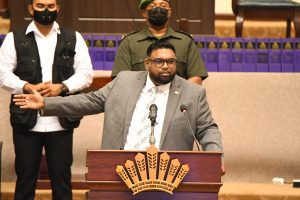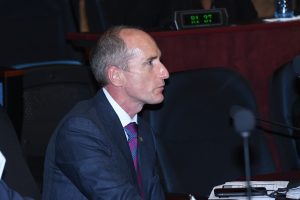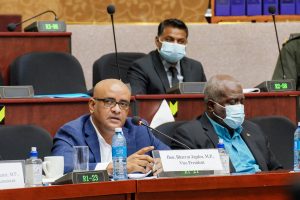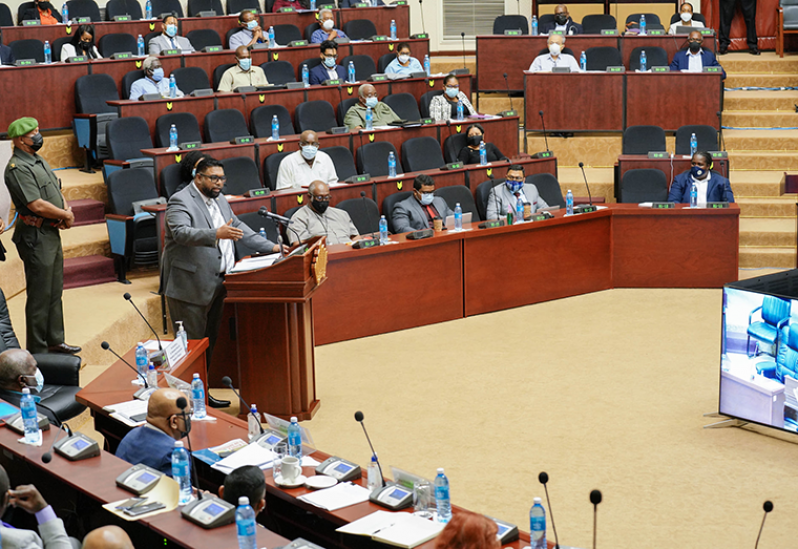–Vice-President Jagdeo says policy would not be disincentive for investments
–Stakeholders call for fair, equitable measures; restructured financial system
By Navendra Seoraj
A POLICY which guides and regulates local participation in existing and emerging sectors must be responsive to change and provide the ‘space’ to accommodate expansions in an economy such as Guyana’s, where there has been an increase in investors’ interest.
Hoteliers, agro-processors, key players in the global energy sector and many other investors are either already in Guyana or are interested in penetrating the country’s growing economy, which has a Gross Domestic Product (GDP) of about US$5 billion.

This attention, while good for Guyana, has expedited the need for there to be a local content policy and subsequent legislation, which will serve as a guide for local participation in various sectors, particularly oil and gas.
It is expected that such a policy would cater for the existing conditions, and while this would indeed be the case, President Dr Irfaan Ali holds firmly to the view that such a framework must not be static.
“Local content is not meant be static… as our country continues to grow and change in nature, different aspects of the economy will evolve and the document has to evolve to match this development,” President Ali said during the opening of a one-month stakeholder engagement forum on local content, at the Arthur Chung Conference Centre, on Monday.
The government, in September, had established an advisory panel on local content. The panel was tasked with undertaking a review of all existing initiatives and policies pertaining to local content in the petroleum sector and to provide guidance for the development of Guyana’s local content policy and legislation.
The panel comprised Shyam Nokta (chair), Carl Greenidge, Anthony Paul, Kevin Ramnarine, Carville Duncan and Floyd Haynes.
While the panel would have done its part, the government has committed to engaging the public and key stakeholders on critical components which should be included in such a significant document.
In outlining his vision for this policy on the first day of the process, President Ali said: “For us, the policy has to be a living policy, one that is flexible, responsive and one that has great clarity and sets a framework through which all are engaged and understand their responsibilities to local content.
“Local content is only about doing business… local content is about building the capacity of local companies, giving them the capability to become globally competitive, so that they can have necessary transformation that would lead them to the next level.”
EVERY SECTOR

It is for this reason that the President said the policy, contrary to the belief that it will focus specifically on oil and gas, would cover every sector in the country.
“While it [oil and gas] will be one critically targeted area, the local content policy is one that will cover every sector of the country. There is focus on insurance; the banking sector; development of manufacturing capacity; rentals, human resource transformation; and training and development in all emerging areas of the economy,” the Head-of-State reasoned.
The policy would particularly address evident shortfalls in the human resource capacity, the level of capital and the utilisation of technology.
“In recognising this [shortfalls], we have to put the systems in place to bridge that gap… in the interim, we have to define a space for local business and local participation while we bridge that gap,” President Ali said.
For instance, the policy must “carve out” the opportunities within the oil-and-gas sector which are available solely to local supplies.
“We are going to move with you [stakeholders] to set targets as to the levels of local content… We have to define it,” President Ali related, reiterating that it would encompass actions and policies across every sector.
Although the policy would be favourable to Guyanese, he assured stakeholders that the government is not against foreign investment, since such an attitude would be detrimental to the economy.
The aim is simply to ensure that investors recognise their roles through regulations and institutions related to a local content policy. This policy, according to President Ali, must have a monitoring and evaluation mechanism which will guide investments and investors.
DISINCENTIVE

Vice-President Bharrat Jagdeo has assured stakeholders that the policy would not include unrealistic objectives, nor would it be a disincentive to persons or companies interested in investing here.
His view is that there must be fairness and equity, but at the same time, legislation and a clear policy which guides, demands and forces companies to act differently. The policy would be buttressed by a new Production Sharing Agreement (PSA) which will govern future relationships between Guyana and other oil-and-gas projects.
“We have the capacity to supply taxi services, vehicle services and we have capacity to build homes to rent to the oil companies… the companies have to utilise local resources for us to get up to a tiny threshold,” Vice-President Jagdeo said.
Speaking specifically about the oil-and-gas sector, he said there must not be uncompetitive rates, but Guyanese have to find a place to grow within the industry, as is the case with every other sector and industry.
“We do not want to set a threshold without consulting with sectors and companies… people have to feel this prosperity, be trained in this sector and build capacity even to monitor the industry [oil and gas],” Jagdeo reasoned.
President of ExxonMobil Guyana, Alistair Routledge, agreed that it is an imperative for Guyana and its people to not only benefit from the revenues of the oil-and-gas sector, but from the creation of local content and capacity-building.
It was reported that ExxonMobil and its prime contractors have spent over $300 million with more than 800 local companies since 2015. More than 2,500 Guyanese companies are registered with the Centre for Local Business Development, which was founded by ExxonMobil and its co-venturers in 2017 to build local business capacity to support global competitiveness.
“It has not been that many years since oil was discovered, but a lot of progress has been made… there has been great progress,” Routledge said.
He agreed, however, that there is greater need for capacity-building to improve the skills of locals to support the sector.
This is an area which the government has already committed to addressing through the construction of a National Oil and Gas Institute.
There, however, remains a need for the streamlining of tax measures and restructuring of financial systems to ensure that Guyanese, apart from being educated, are able to benefit tangibly from opportunities which may arise in the oil-and-gas sector and other industries.
Dean of the School of Entrepreneurship and Business Innovation at the University of Guyana Dr. Leyland Lucas, was among the stakeholders who advised the government to undertake restructuring of the financial system to open up avenues for funding.

Chairman of the Private Sector Commission (PSC) Nicholas Boyer, said too that while the tax administration needs to be streamlined, the policy drafted by the panel is a step in the right direction.
“The policy is a kin for national development… we will digest the document and make formal recommendations,” Boyer said.
Vice-President of the Georgetown Chamber of Commerce and Industry (GCCI), Timothy Tucker, while also commending the government for their forward step, said a local content policy must include provisions for businesses to benefit from government spending.
After listening to the recommendations and comments, both President Ali and Vice-President Jagdeo assured stakeholders that everything will be reviewed and a subsequent discussion will be held.



.jpg)











